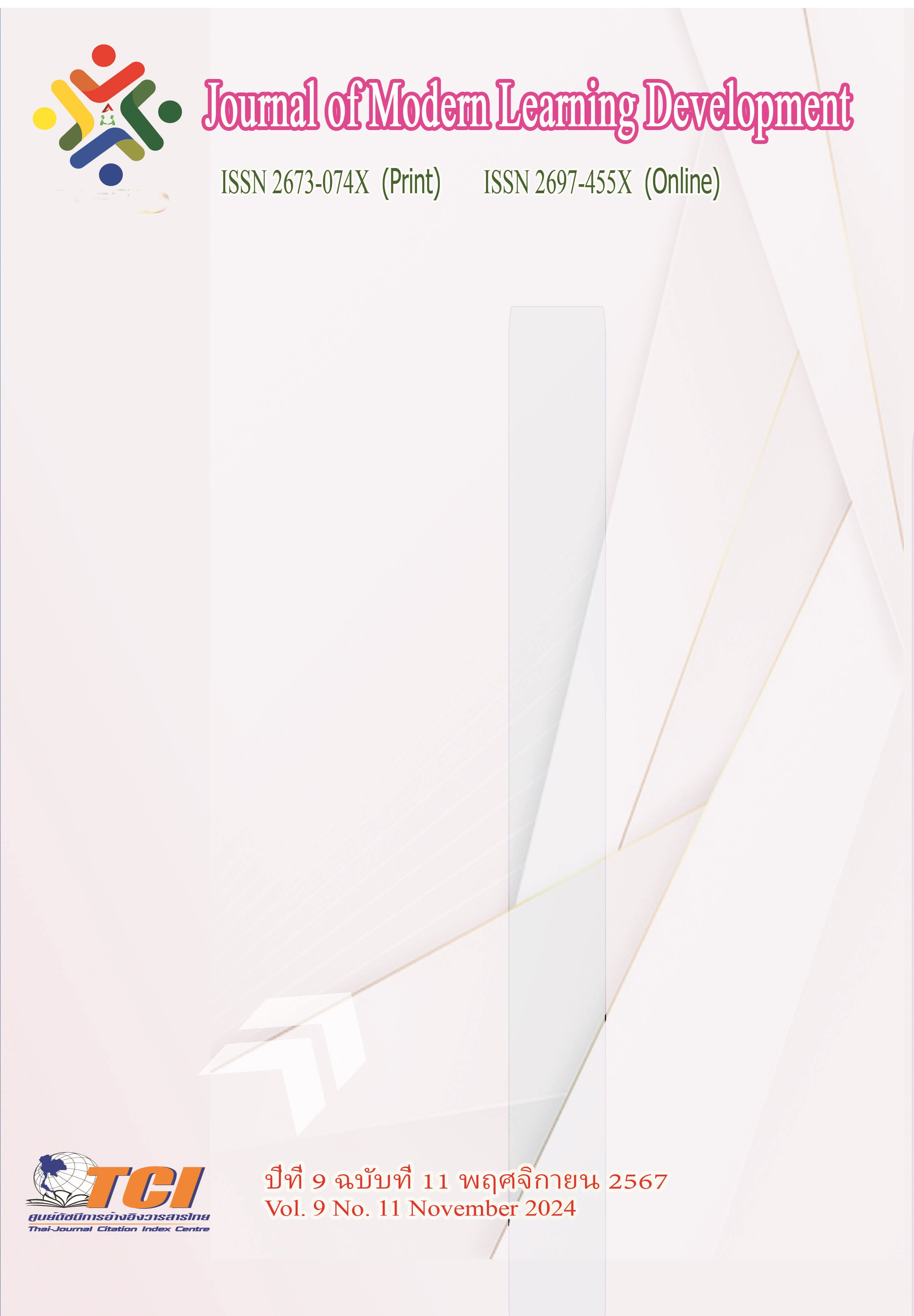Development of Critical Reading Achievement of Mathayomsuksa 3 Students With Metacognition Strategies and Mind Mapping
Main Article Content
Abstract
The development of critical reading achievement of mathayomsuksa 3 students with metacognition strategies and mind mapping is experimental research which aims to 1) to compare the before and after achievements in the critical reading using the Metacognition strategies and mind mapping of Mathayomsuksa 3 students. 2) To investigate the opinions of Mathayomsuksa 3 students, affecting the learning management model for the development of the achievement in critical reading using the Metacognition strategies and mind mapping.
A sample is 36 Mathayomsuksa 3/1 students of Bangsaphannoiwitthayacom School, The study was operated in the second semester of the academic year 2023. The instruments in this study are 1) an instruction plan for Critical reading using the Metacognition strategies and mind mapping were 5 plan. 2) A critical reading ability test. 3) an opinion questionnaire of students, affecting learning management using Metacognition strategies and mind mapping. The data analyzed by the statistics are means (M), standard deviation (SD) and t-test dependent.
The results of this research were as follows: 1) The achievement of the critical reading of Mathayomsuksa 3 students after learning management using the Metacognition strategies and mind mapping was statistically higher than before learning at the significant level of 0.5. and 2) The opinions of Mathayomsuksa 3 students that affect the learning management using the Metacognition strategies and mind mapping at the most level (M = 4.81, SD = 0.38).
Article Details
References
กลุ่มงานวิชาการ โรงเรียนบางสะพานน้อยวิทยาคม (2565). รายงานการทดสอบทางการศึกษาระดับชาติขั้น
พื้นฐาน (O-NET) ปีการศึกษา 2563-2565 ของนักเรียนชั้นมัธยมศึกษาปีที่ 3. โรงเรียนบางสะพานน้อยวิทยาคม.
กาญจนา คุณารักษ์. (2558). การออกแบบการเรียนการสอน. นครปฐม: มหาวิทยาลัยศิลปากร.
ธัญญา ผลอนันต์และขวัญฤดี ผลอนันต์. (2550). Mind Mapping กับการศึกษาและการจัดการความรู้.กรุงเทพฯ: ขวัญข้าว.
ปวีณ์สุดา ขยันการ (2561). การพัฒนาผลสัมฤทธิ์การอ่านสื่อออนไลน์อย่างมีวิจารณญาณของนักเรียน ชั้นมัธยมศึกษาปีที่ 4 โดยใช้การจัดการเรียนรู้ด้วยวิธี QUEST.วิทยานิพนธ์ศึกษาศาสตรมหาบัณฑิต. สาขาวิชาการสอนภาษาไทย. บัณฑิตวิทยาลัย: มหาวิทยาลัยศิลปากร.
พิมพันธ์ เดชะคุปต์. (2544). เมตาคอกนิชัน: วิทยาการด้านการคิด. กรุงเทพมหานคร: บริษัทเดอะมาสเตอร์กรุ๊ปแมเนจเม้นท์ จำกัด.
มาเรียม นิลพันธุ์. (2558). วิธีวิจัยทางการศึกษา. (พิมพ์ครั้งที่ 9). นครปฐม: ศูนย์วิจัยและพัฒนาการทางการศึกษา คณะศึกษาศาสตร์ มหาวิทยาลัยศิลปากร.
รัตน์ติยา ใช้สอย. (2565). การจัดการเรียนรู้ด้วยแผนผังความคิดที่มีต่อผลสัมฤทธิ์ด้านการอ่านของนักเรียนชั้นประถมศึกษาปีที่ 1. ปริญญาการศึกษามหาบัณฑิต. สาขาหลักสูตรและการสอน. บัณฑิตวิทยาลัย: มหาวิทยาลัยนเรศวร.
ฤทัยรัตน์ ลอยเจริญ และบัญญัติ ชำนาญกิจ. (2557). การใช้ยุทธวิธีเมตาคอกนิชันในการสอนอ่านภาษาไทย. วารสารวิชาการและวิจัยสังคมศาสตร์. 9 (26), 1-12.
สมถวิล วิเศษสมบัติ. (2550). วิธีสอนภาษาไทยระดับมัธยมศึกษา. กรุงเทพมหานคร: ภาควิชาภาษาไทย คณะมนุษยศาสตร์และสังคมศาสตร์ วิทยาลัยครูสวนสุนันทา.
สุนันทา มั่นเศรษฐวิทย์. (2543). หลักและวิธีสอนอ่านภาษาไทย. (พิมพ์ครั้งที่ 5). กรุงเทพมหานคร: ไทยวัฒนาพานิช.
เอมอร เนียมน้อย. (2551). พัฒนาการอ่านอย่างมีวิจารณญาณด้วยวิธี SQ3R. กรุงเทพมหานคร: สุวีริยาสาส์น.
Anderson, L. W., & Krathwohl, D. R. (2001). A Taxonomy for Learning, Teaching and Assessing: A Revision of Bloom’s Taxonomy of Educational Objectives: Complete Edition. New York: Longman.
Ausubel, D. P. (1968). Educational psychology: A cognitive view. Holt, Rinehart and Winston.
Baker, L., & Brown, A. L. (1984). Metacognitive skills and reading. In P. D. Pearson, R. Barr, M. L. Kamil and P. Mosenthal (Eds.), Handbook of Reading Research
(pp. 353-394). New York: Longman.
Buzan, T. (1974). Use your head. BBC Books.
Buzan, T. (1991). The mind map book. New York: Penguin.
Eppler, M. J. (2006). A comparison between concept maps, mind maps, conceptual diagrams, and visual metaphors as complementary tools for knowledge construction and sharing. Information Visualization, 5 (3), 202-210.
Flavell, J. H. (1979). Metacognition and cognitive monitoring: A new area of cognitive-developmental inquiry. American Psychologist, 34 (10), 906-911.
Johnson, D. W., & Johnson, R. T. (2009). An Educational Psychology Success Story: Social
Interdependence Theory and Cooperative Learning. Educational Researcher, 38, 365-379.
Liu, P. L., Chen, C. J., & Chang, Y. J. (2010). Effects of a computer-assisted concept mapping learning strategy on EFL college students' English reading comprehension. Computers & Education, 54 (2), 436-445.
Liu, Y., Zhao, G., Ma, G., & Bo, Y. (2021). The effect of mind mapping on reading comprehension ability of Chinese EFL learners. Theory and Practice in Language Studies, 11 (4), 411-421.
Merchie, E., & Van Keer, H. (2016). Mind mapping as a meta-learning strategy: Stimulating
pre-adolescents’ text-learning strategies and performance. Contemporary Educational Psychology, 46, 128-147.
Pang, Y., Zhang, G., & Pang, L. (2019). The effects of metacognitive strategy training on
reading comprehension of Chinese EFL learners. Asian EFL Journal, 21 (2),
-178.
Paris, S. G., & Paris, A. H. (2001). Classroom applications of research on self-regulated learning. Educational Psychologist, 36 (2), 89-101.
Pressley, M., & Afflerbach, P. (1995). Verbal protocols of reading: The nature of constructively responsive reading. Hillsdale, NJ: Erlbaum.
Zimmerman, B. J., & Moylan, A. R. (2009). Self-regulation: Where metacognition and motivation intersect. In D. J. Hacker, J. Dunlosky, & A. C. Graesser (Eds.), Handbook of metacognition in education (pp. 299-315). New York: Routledge.


